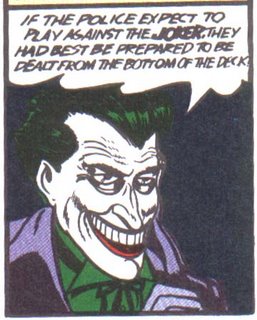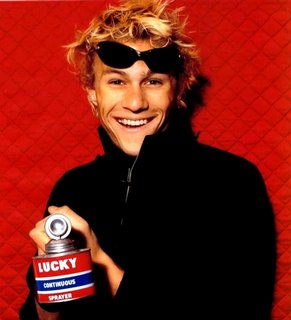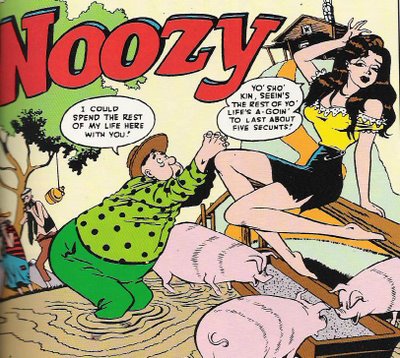Saturday, August 26, 2006
Great Moments In Phonetic Spelling
Wednesday, August 23, 2006
From Floppity-Rabbits to Horror-Squinkies
I'm barreling through Jeet Heer and Kent Worcester's dazzling 2004 anthology of pre-1960s comics criticism, Arguing Comics: Literary Masters on a Popular Medium. It's an important key to understanding of America's early cultural responses to comics—many, if by no means all, negative or at least highly ambivalent. From severe, Protestant excoriations of the fin de siecle illustration/photography explosion, to modernist appreciations of Krazy Kat's surrealism, to Robert Warshow's compellingly conflicted reaction to his young son's EC Comics fixation, the book's selections alternatively frustrate, surprise, and reveal--sometimes they reveal less about comics than they do about the world views and fears of the intellectuals confronting them. Occasionally, the writing startles.
Perhaps the most passionate (not to say best) essay in the book is by Gershon Legman, whose excerpt from his 1949 book Love and Death: A Study in Censorship hits all of the expected mid-century, Wertham-era notes about the corrosive nature of comics, particularly their glorification of fascist violence. It's all wrapped in the overheated language of the concern troll, allegedly defending against the explotation and degredation of the masses, but simultaneously dripping with contempt for all the slow-moving cows who make such easy targets. Still, it's hard not to get just a little swept up in his passion, difficult to deny the retardation of crass, dehumanizing violence. In all of this he's well within the liberal censor/scold tradition. Superman feeds the "paranoid hostility" of the audience, he's a "one-man flying lynch mob", as well as a perfect authoritarian stooge, etc., etc.. But in the last few paragraphs of the essay he pivots toward another of Dr. Frederic Wertham's bugaboos, in a way that really wakes up the modern reader:
One of my favorite Wikipedia entries ever describes Legman: "As a young man he acquired a number of interests including sexuality, erotic folklore, and origami." Yes, have you seen my paper cranes? Oh, or my collection of shaved redheads magazines? (Hell, even his name was Legman.) Described one way, as a sex freak and paper folder who puked at the thought of war and its mass-marketed propaganda, Legman sounds perfectly reasonable. Hey, I'm a sex freak. I too hate war. I can even make a hat for my kid out of a newspaper. Let's drink beers! But Legman had more than that rattling around in his head. I can see where he's going; that violence, and the acquiescence to/enabling of violence, is a fundamental weakness, something to be scorned. Homosexuality serves Legman's purpose as a metaphor for this weak, shameful pull toward the thumb-sucking cowardice of violent authoritarianism. It's still ugly stuff, fatally compromised by its dated conception of sexuality, difficult to read.
Perhaps the most passionate (not to say best) essay in the book is by Gershon Legman, whose excerpt from his 1949 book Love and Death: A Study in Censorship hits all of the expected mid-century, Wertham-era notes about the corrosive nature of comics, particularly their glorification of fascist violence. It's all wrapped in the overheated language of the concern troll, allegedly defending against the explotation and degredation of the masses, but simultaneously dripping with contempt for all the slow-moving cows who make such easy targets. Still, it's hard not to get just a little swept up in his passion, difficult to deny the retardation of crass, dehumanizing violence. In all of this he's well within the liberal censor/scold tradition. Superman feeds the "paranoid hostility" of the audience, he's a "one-man flying lynch mob", as well as a perfect authoritarian stooge, etc., etc.. But in the last few paragraphs of the essay he pivots toward another of Dr. Frederic Wertham's bugaboos, in a way that really wakes up the modern reader:
The exploitation of brutality and terror is blatantly apparent. The homosexual element lies somewhat deeper. It is not—at least not importantly—in the obvious faggotry of men kissing one another and saying "I love you," and then flying off through space against orgasm backgrounds of red and purple, not in the transvestist scenes in every kind of comic-book from floppity-rabbits to horror-squinkies, not in the long-haired western killers with tight pants (for choice).I will interrput only to say that Legman here makes old comic books sound completely fucking awesome, and I want to know exactly which Golden Age comics he was reading, or failing that, precisely what drugs he was on. He continues:
Neither is it in the explicit Samurai subservience of the inevitable little-boy helpers—theoretically identification shoe-horns for children not quite bold enough to identify themselves with Superprig himself—nor in the fainting adulation of thick necks, ham fists, and well-filled jock-straps; the draggy capes and costumes, the shamanistic talismans and superstitions that turn a sissified clerk into a one-man flying lynch-mob with biceps bigger than his brain. It is not even in the two comic-book companies staffed entirely by homosexuals and operating out of our most phalliform skyscraper (emphasis mine, all mine—CO)Damn those murderous, conformist, brown-shirt homosexual cowards in their giant penis towers! Of course I'm familiar with Wertham's famous accusations of Batman and Robin's alleged gayness, and Wonder Woman's lesbianism. Feiffer's Great Comic Book Heroes hipped me to all that when I was 7 years old. I also know that homosexuality was not so long ago considered by leading "liberal" psychologists a mental illness or weakness of character--arrested development, pathological narccisism, what have you. But Legman really lays it bare. Comics are violence. Comics are queer. Homosexuality is violence. This is from a guy who coined the term "make love not war", a researcher for the Kinsey Institute, a "proto-hippy" as the editors call him who spent decades collecting dirty limericks and who eventually relocated to France to escape US government harrassment over publishing obscenity. (Then again, Wertham himself was a liberal crusader, who like Holy Joe Lieberman today on video games, was just worried about the helpless children.)
The really important homosexuality of the Superman theme—as deep in the hub of the formula as the clothes and kisses are at the periphery—is the lynching pattern itself, in the weak and fearful righteousness with which it achieves its wrong. No matter how bad criminals (or even crime-comics) may be, in identfying himself with them the child does consummate his Oedipean dream of strength; the criminal does break through his environment. The Superman, the Supersleuths, the Super-cops do not. They align themselves always on the side of law, authority, the father; and accept their power passively from a bearded above. They are not competing—not for the forbidden mother, not for any other reward. Like Wild Bill Hickock, our own homosexual hero out thar where men were men—with his long silk stockings and his Lesbian side-kick, Calamity Jane—they are too unvirile to throw off fear, and kill as criminals. Instead, unseen and unsuspected in some corner, they put on a black mask, a sherrif's badge and a Superman suit, and do all of their killing on the side of the law.
One of my favorite Wikipedia entries ever describes Legman: "As a young man he acquired a number of interests including sexuality, erotic folklore, and origami." Yes, have you seen my paper cranes? Oh, or my collection of shaved redheads magazines? (Hell, even his name was Legman.) Described one way, as a sex freak and paper folder who puked at the thought of war and its mass-marketed propaganda, Legman sounds perfectly reasonable. Hey, I'm a sex freak. I too hate war. I can even make a hat for my kid out of a newspaper. Let's drink beers! But Legman had more than that rattling around in his head. I can see where he's going; that violence, and the acquiescence to/enabling of violence, is a fundamental weakness, something to be scorned. Homosexuality serves Legman's purpose as a metaphor for this weak, shameful pull toward the thumb-sucking cowardice of violent authoritarianism. It's still ugly stuff, fatally compromised by its dated conception of sexuality, difficult to read.
Heath Ledger/Joker
Pardon the consecutive straight-up fanboy posts. It's my break from reading Irving Howe essays on the evils of mechanized mass culture as represented by comics, and articles on the subtle uses and meanings of word balloons in Asterix. Anyway:


Whatever else you could say, dude's certainly got the grin and the chin for the part. I'm sold.


Whatever else you could say, dude's certainly got the grin and the chin for the part. I'm sold.
Batman Is In Very Good Hands
Current Batman comic book writer Grant Morrison at Newsarama on Frank Miller's forthcoming Batman Vs. Al Qaeda train-wreck, Holy Terror, Batman:
First off, the idea that superhero comics should reflect the news headlines is not one I tend to subscribe to. I've always preferred using my comics to talk about the world around me in the language of symbolism and metaphor and I'm more interested in telling stories about how people behave in bizarre situations than I am in commenting on current events...while I won't pretend we all live on Sunnybrook Farm, I don't think its appropriate - particularly in trying times - to present our fictional heroes as unsmiling vengeance machines. I'd rather Batman embodied the best that secular humanism has to offer - a sour-faced, sexually-repressed, humorless, uptight, angry, and all-round grim 'n' gritty Batman would be more likely to join the Taliban surely?...Batman vs. Al Qaeda! It might as well be Bin Laden vs. King Kong! Or how about the sinister Al Qaeda mastermind up against a hungry Hannibal Lecter! For all the good it's likely to do. Cheering on a fictional character as he beats up fictionalized terrorists seems like a decadent indulgence when real terrorists are killing real people in the real world. I'd be so much more impressed if Frank Miller gave up all this graphic novel nonsense, joined the Army and, with a howl of undying hate, rushed headlong onto the front lines with the young soldiers who are actually risking life and limb 'vs' Al Qaeda.Next, Director Christopher Nolan on the Joker in his upcoming Batman sequel, The Dark Knight:
I would certainly point to The Killing Joke but I also would point very much to the first two appearances of the Joker in the comic. If you look at where the Joker comes from there’s a very clear direction that fits what we’re doing very well.Add Paul Dini on Detective Comics, plus another Englehart/Rogers revival mini-series on the way, and it actually starts to make up for the past 20 years of terrible, terrible Batman.
